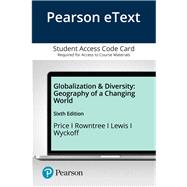Empower students to address global issues.
Globalization and Diversity: Geography of a Changing World incorporates a contemporary, thematic approach to introduce the latest ideas and concepts in world regional geography. The text provides the core materials for developing a strong foundation in the fundamentals of world regions and a strong sense of place for an understanding of the connections within and between world regions. With a focus on the environment and globalization, the text's arresting visual layout and updated content combine to offer an accurate portrayal of the world's evolving regional landscapes.
For courses in world regional geography.
Pearson eText is an easy-to-use digital textbook that you can purchase on your own or instructors can assign for their course. The mobile app lets you keep on learning, no matter where your day takes you -- even offline. You can also add highlights, bookmarks, and notes in your Pearson eText to study how you like.
NOTE: This ISBN is for the Pearson eText access card. Pearson eText is a fully digital delivery of Pearson content. Before purchasing, check that you have the correct ISBN. To register for and use Pearson eText, you may also need a course invite link, which your instructor will provide. Follow the instructions provided on the access card to learn more.








